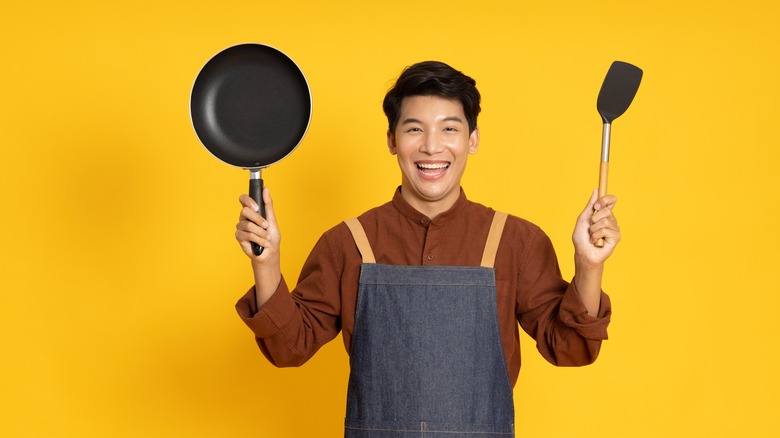For Perfectly Cooked Eggs, Choose The Right Spatula For The Job
Having the right tools in the kitchen is always important to ensure a successful cooking experience. Thanks to their fragile nature, this is especially true when it comes to cooking eggs. This is why non-stick pans and cast iron skillets are so popular for making omelets and frying or scrambling eggs. They are the best tools for the job. But there is another instrument that often gets overlooked despite being just as essential. And that's using the right spatula.
Spatulas matter for a couple of different reasons and the risk of scratching up a non-stick pan with a metal utensil isn't the only one. Even the simplest sunnyside-up egg can end up with a broken yolk from folding over the side of the spatula or falling back into the pan. Likewise, scrambled eggs can clump up and cook poorly with the wrong material, creating a mess of stuck-on food that will be a pain to clean after breakfast. And of course, you have to have the right tool to pull poached eggs out of the pot or all of that work will be for naught.
As you can see, it's super important to match your spatula with the type of eggs that you're making. This is not a one-size-fits-all situation. Sure, that does mean you'll probably need a whole collection, but it will be well worth it in the end.
Which spatula is best for which eggs?
If you want to keep the yolk intact when cooking an egg, it's important to use a spatula that is wide enough to accommodate the whole egg. This is true whether you are a fan of sunnyside-up and only cook the eggs on one side, or you're making them over-easy. Over-easy, over-medium and even over-hard eggs can end up with a broken yolk if the spatula used to flip them is too small. And it should be coated in silicone or rubber so that it doesn't damage your non-stick pan.
Scrambled eggs require an entirely different type of spatula. Since you won't be flipping the eggs, material is more important than width. Silicone's ability to stand up to high heat makes it the best choice. And since you'll be stirring and scraping, you'll want the same type of slim, flat spatula that's used for coaxing cake batter out of a mixing bowl.
For omelets, you'll want an omelet turner with a firm yet flexible edge that's also thin enough to easily slide under the omelet. It should have a long, tapered end that can flip the whole omelet. A silicone coating is also ideal, both to protect your pan and for its firm flexibility.
The egg spatula that isn't a spatula
Poached eggs don't require a spatula, but instead a more specialized piece of equipment called a spider strainer. The long-handled tool has a wire basket attached at the end, which allows for easy scooping. Since the basket is not one solid piece, the water will simply pass through so that only the egg is removed from the pot. Its angled sides make it easy to get under the egg, unlike a mesh strainer which tends to have a thicker ring that is harder to maneuver.
While you could technically try to use an oversized slotted spoon, it will be harder to catch the egg and you might end up chasing it around the pot — which could lead to overcooking. Worse, the egg could end up breaking open in the process. On the other hand, the spider strainer's wide basket makes it easy to scoop it up in a jiffy.
If you want perfectly cooked eggs, you've got to pay attention to your tools. Eggs are more prone to breakage and tearing than other foods, so this isn't an area that you should scrimp on in the kitchen. It will be well worth the investment to have the right spatulas for every type of egg.


